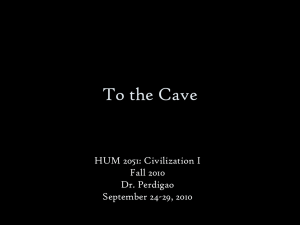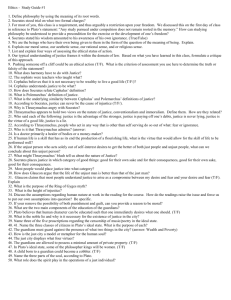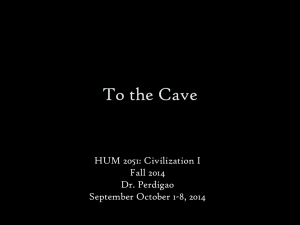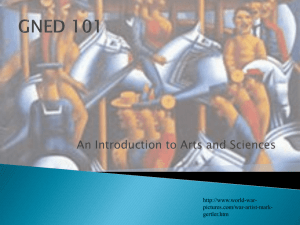Book II
advertisement
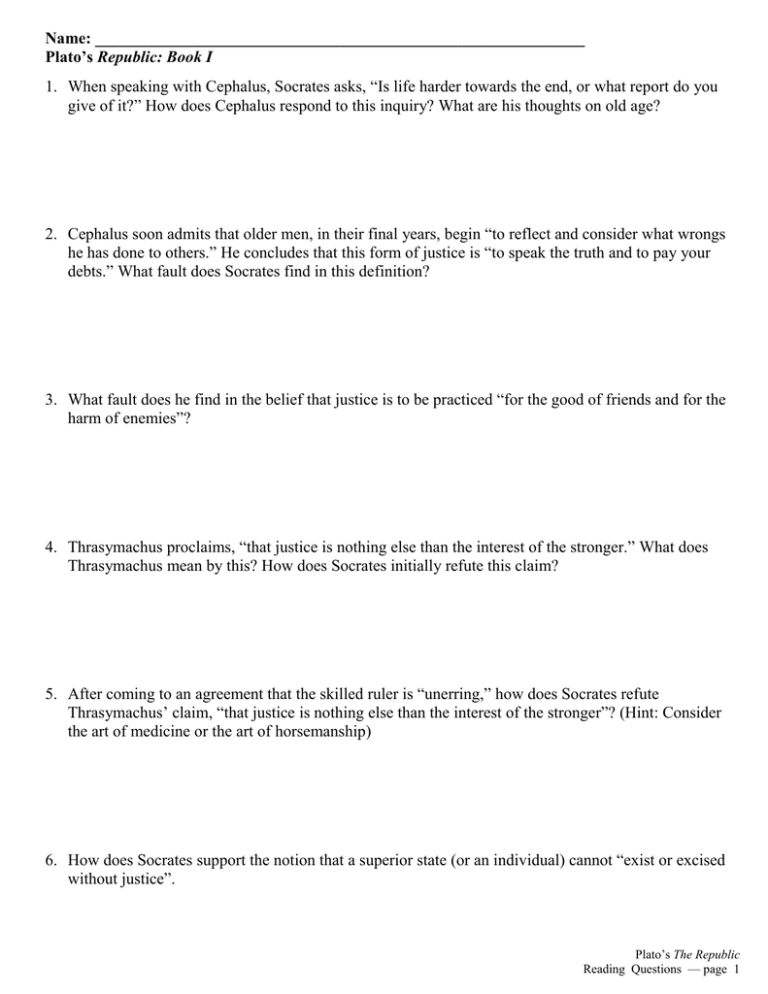
Name: ____________________________________________________________ Plato’s Republic: Book I 1. When speaking with Cephalus, Socrates asks, “Is life harder towards the end, or what report do you give of it?” How does Cephalus respond to this inquiry? What are his thoughts on old age? 2. Cephalus soon admits that older men, in their final years, begin “to reflect and consider what wrongs he has done to others.” He concludes that this form of justice is “to speak the truth and to pay your debts.” What fault does Socrates find in this definition? 3. What fault does he find in the belief that justice is to be practiced “for the good of friends and for the harm of enemies”? 4. Thrasymachus proclaims, “that justice is nothing else than the interest of the stronger.” What does Thrasymachus mean by this? How does Socrates initially refute this claim? 5. After coming to an agreement that the skilled ruler is “unerring,” how does Socrates refute Thrasymachus’ claim, “that justice is nothing else than the interest of the stronger”? (Hint: Consider the art of medicine or the art of horsemanship) 6. How does Socrates support the notion that a superior state (or an individual) cannot “exist or excised without justice”. Plato’s The Republic Reading Questions — page 1 7. Socrates establishes that all things have an end and a special excellence, and “when deprived of their own proper excellence they cannot fulfill their end.” How does Socrates use this to logically explain that the “just is happy, and the unjust miserable”? Name: ____________________________________________________________ Plato’s Republic: Book II 1. What three variations of goods are there? Which class does justice fall within? 2. After telling the story of Gyges, a thought experiment is put forth consisting of what two types of individuals? At the end of the thought experiment, who is considered the happier of the two? Why? 3. What justification is provided in collaborating with others to create the State? 4. The conversation eventually leads to the establishment of the “guardian,” which holds significant importance to the State. Why is the role of the guardian compared to that of a “well-bred dog” and how is this dog like a “true philosopher”? 5. What two divisions will “he who is to be a really good and noble guardian of the State” be educated in his youth? Plato’s The Republic Reading Questions — page 2 6. What reasoning is provided in requiring “a censorship of the writers of fiction” in the education of the guardian? What two principles are established that serve as a foundation for this portion of their education? 7. Plato’s Republic: Book III: What explanation is given regarding the guardian’s “way or life”? Name: ____________________________________________________________ Plato’s Republic: Book IV 1. Adeimantus expresses concern for the guardians when claiming that Socrates is “making these people miserable, and that they are the cause of their own unhappiness; the city in fact belongs to them, but they are none the better for it.” How does Socrates respond? 2. What are identified as being the causes of the deteriorations of the arts? In what way do they deteriorate the arts? 3. What advise is given to guardians in regards to managing the size of the State? Plato’s The Republic Reading Questions — page 3 4. Socrates claims, “the direction in which education starts a man, will determine his future life.” Thus, guardians must commit to an education that is focused on which principles of virtue? Which contributes most to the excellence of the State? Explain. 5. In Socrates’ attempt in argue that the concept of justice can be verified in the individual as well as in the State, he explores the three principles of the soul. What are the three principles of the soul he identifies? Which principle of virtue does each represent? Which class within the State does each represent? Plato’s The Republic Reading Questions — page 4 Name: ____________________________________________________________ Plato’s Republic: Book VII 1. In Plato’s “Allegory of the Cave,” identify the symbolic meaning of each: a) the den, or cave: d) the animals made of wood/stone: b) the chains of the prisoners: e) the world beyond the cave: c) shadows of the animals made of wood/stone f) the sun: 2. What role do our guardians of the state, our philosophers, play in this allegory? What is their responsibility? 3. When considering the education of our guardians, or “warrior athletes,” beyond the former scheme of education (gymnastics and music), what academic subjects will they pursue? How do they have both military and philosophical application? 4. “When all these studies reach the point of intercommunion and connection with one another, and come to be considered in their mutual affinities, then, I think, but not till then, will the pursuit of them have a value for our objects.” Explain the final mode of education that will lead our guardians to the “end of the intellectual world”? 5. What are the four categories of science that aid the “eye of the soul” in being “lifted upwards”? What categories do they represent? What is their hierarchy/relationship to each other? 6. What is said regards to mandating that children participate in this educational system? Plato’s The Republic Reading Questions — page 5 7. When considering the educational journey of the guardian, what is to be come of them at the age of… a. Twenty? b. Thirty? c. Thirty-Five? d. Fifty? Plato’s The Republic Reading Questions — page 6
